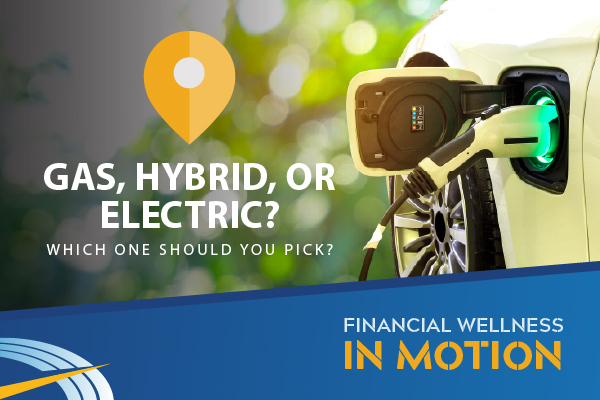
There’s a certain sense of individuality and personality wrapped up in a person’s car or truck of choice. Those characteristics include budgeting, driving habits, environmental concerns, safety, comfort, as well as fuel efficiency or range. With so many vehicle choices out there, which one is right for you? Let’s look at the pros and cons for today’s gas, hybrid, and electric vehicles.
Gas-Powered Vehicles Mean Convenience and Lower Costs
With gas-powered vehicles, you’ll have access to hundreds of thousands of gas stations dotted across the U.S., according to the National Association of Convenience Stores. These vehicles refuel fast (in five minutes or less) and often cost less than hybrid or electric vehicles, whether you buy new or used.
Drawbacks include fluctuating gas prices and the cost of maintenance (oil, antifreeze, and many moving parts). Plus, gas-powered vehicles create quite a bit of pollution, emitting 400 grams of C02 per mile, according to the Environmental Protection Agency.
Hybrid Vehicles Bring the Best of Both Worlds
Mingling the benefits of the gas-powered infrastructure with the efficiency and lower emissions of an electric vehicle, hybrid models continue to be a favorite for many new car owners. Hybrid models will get among the best miles per gallon by using gasoline to charge the electric battery.
The drawbacks of hybrids include higher upfront costs, similar gas emissions, and more maintenance, with the need to change the oil and spark plugs along with battery upkeep.
Are You Ready for an Electric Vehicle?
Electric vehicles (EVs) are cheaper to run per mile than gas-powered cars. Plus, they can be more energy efficient, depending on how your electricity is generated. Additionally, tax incentives do help lower the initial cost of EVs. Plus, these cars and trucks are head-turners, making any driver look good.
EV downsides include limited range compared to gas-powered cars or trucks. Plus, there are not nearly as many charging stations as gas stations. While the price of today’s new electric vehicles is dropping, they’re still more expensive than their gas-powered cousins. According to Kelley Blue Book, the average price for a new EV in September 2023 was $50,000, while the average price of a comparable gas-powered car was around $40,000.
Today’s Vehicles Offer Amazing Safety
Some models include self-driving, lane departure warnings, automatic emergency braking, adaptive cruise control, and more. Before you buy a new vehicle, check out its safety rating with the National Highway Traffic Safety Administration.
Are you shopping for a new or used vehicle? Transportation FCU can help you finance it. We can even help you find the right model with our Car Buying Service powered by TrueCar.


